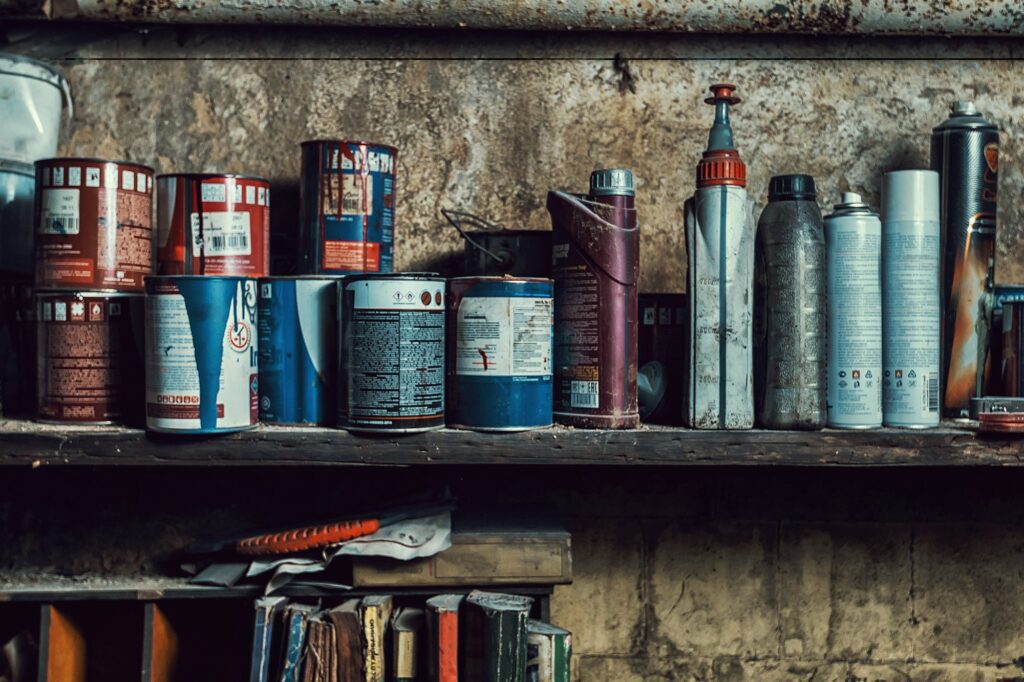When certain household items from our garages, basements, laundry rooms and bathrooms go down the drain at your home or business, the materials and/or chemicals within them will (eventually) disrupt natural habitats, hurt wildlife and harm the environment. That’s because pollutants, poisons and chemicals don’t always get filtered out by our wastewater treatment plant.
Poisons in the environment
Medications
Unused or expired medications should never go down the bathroom sink or be flushed.
PROPER DISPOSAL: The correct (and safest) way to dispose of medications, vitamins and other pharmaceuticals is to take them to a designated disposal facility.

Household Chemicals and Paints
Oils, paints, poisons, fuels and other chemicals should not go in floor drains or utility sinks. Even though these are liquids, they can be extremely toxic.
PROPER DISPOSAL: Dane County Clean Sweep does accept these materials for safe disposal. They also accept a variety of electronics (TVs, monitors, computer parts, microwaves, etc.) for a small fee.
Pro tip for latex and water-based paints: While you can clean up small amounts of latex paint (from hands, clothes and used brushes/rollers/pans) in the sink, you should not dump remains of the can down the drain. Instead, harden the paint that remains in the can (either air dry or add kitty litter) and put the can in the garbage.
Water Softener Salt
Home water softeners are the biggest contributors of chloride in wastewater. Unfortunately, our wastewater plant does not remove chloride during the treatment process; what comes to our plant returns to freshwater streams and rivers.
PROPER DISPOSAL: We’re not suggesting total removal of your water softener, but we do see the importance of ensuring your water softener is efficient and not contributing unnecessary salt to waterways. Learn more about hard water, water softener efficiency and what you can do to reduce salt use at home. And, be sure to read our article “Soften water with less salt using blending valves.“

Cleaning PODs
Detergent pods for clothes and dishwashers do contribute to microplastics. All of these types of materials use a substance (PVA) that breaks down in water to release the contents. However, the PVA used for dishwasher detergent pods and Tide pods is a significant contributor to the microplastics issue. In other words, products that apparently dissolve in water can still present issues to the environment.
PROPER DISPOSAL: Use cleaning products in their powder or liquid state, without a plastic casing. You’ll help keep our waterways cleaner.
CONTACTS
Another contributor to microplastics in waterways is when disposable contacts are flushed.
PROPER DISPOSAL: When you take out contacts that will no longer be used, put them in the trash and not down the drain.
Phosphorus
Excess phosphorus in waterways creates algae growth. And residents in our service area all contribute to the problem with what we eat and how we take care of our homes.
When it rains, leaves and grass clippings that lay in the streets can run off into stormwater systems (these are separate from the District’s sewer lines) and lead to our beautiful lakes. Lawn fertilizers can also run off into stormwater drains. Pet waste that isn’t picked up can also create phosphorus run-off.
PROPER DISPOSAL: Rake and bag your leaves and grass clippings and take them to your local drop-off site for organic matter. Pick up pet waste with a bag and place in the trash (not in the toilet.) Watch your phosphorus intake to reduce excess levels of phosphorus in your excrement. And, be sure to read our blog article “Simple ways to reduce phosphorus pollution” for additional phosphorus reduction strategies.
Remember, any poisons or pollutants you put down the drain return to the environment in our treated water. So, it is everyone’s responsibility to take care of the water you use, before it gets to the treatment plant. While we clean water to the best of our ability, we cannot remove everything from the wastewater that arrives at the plant. Do your part to protect pipes and the environment!
Learn more about pollution prevention, resource recovery and how important it is to respect every drop. And, be sure to check out our blog article “Household items: Garbage disposal, toilet or trash?”






